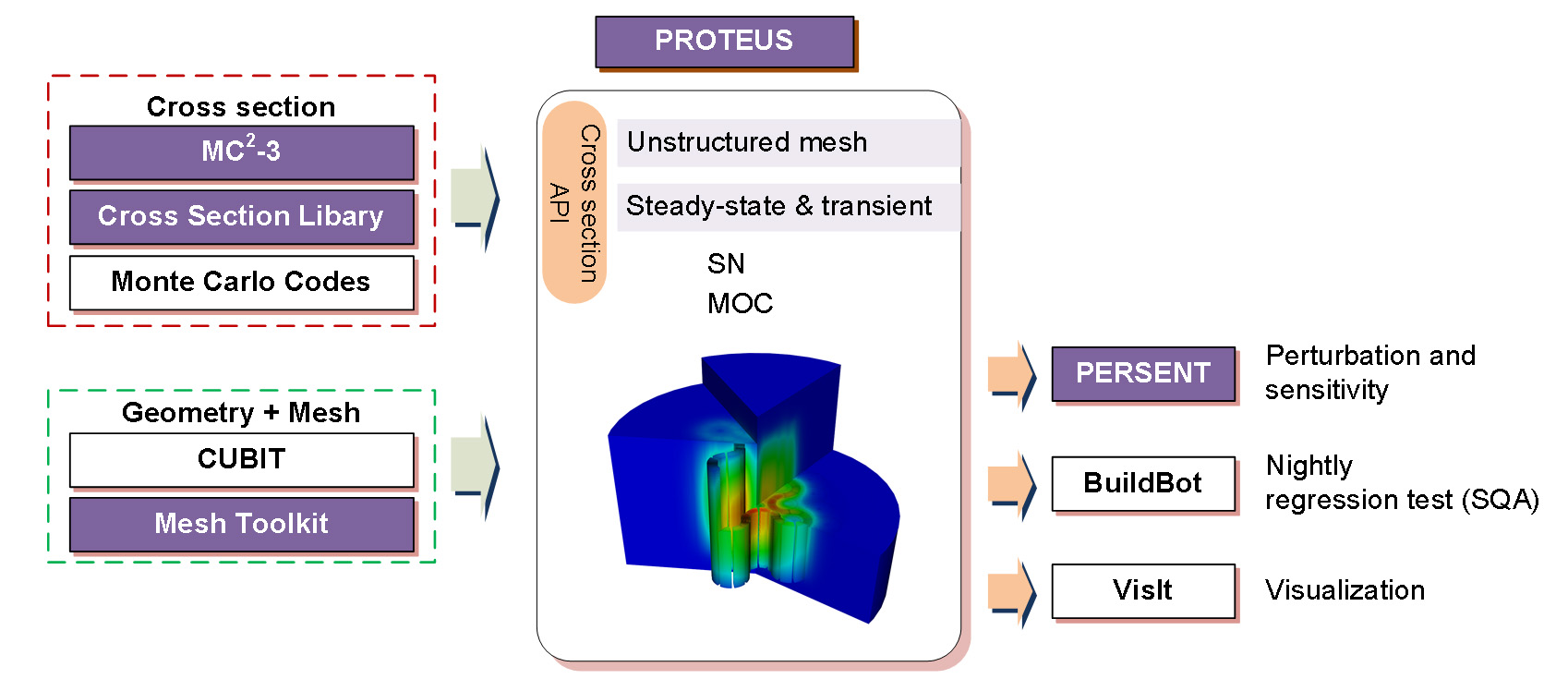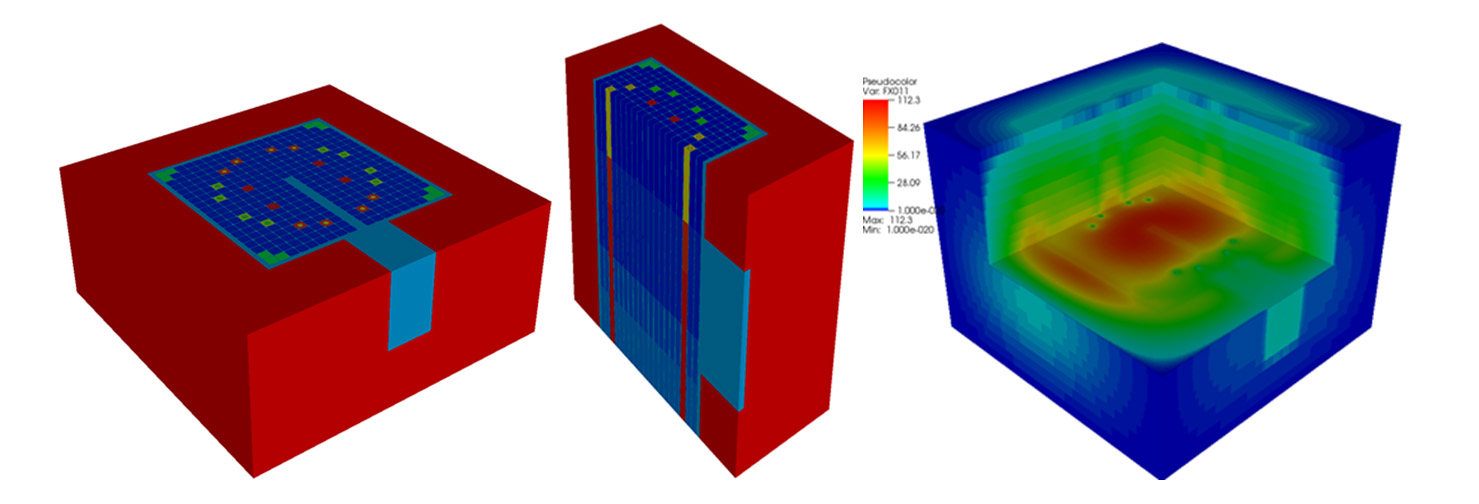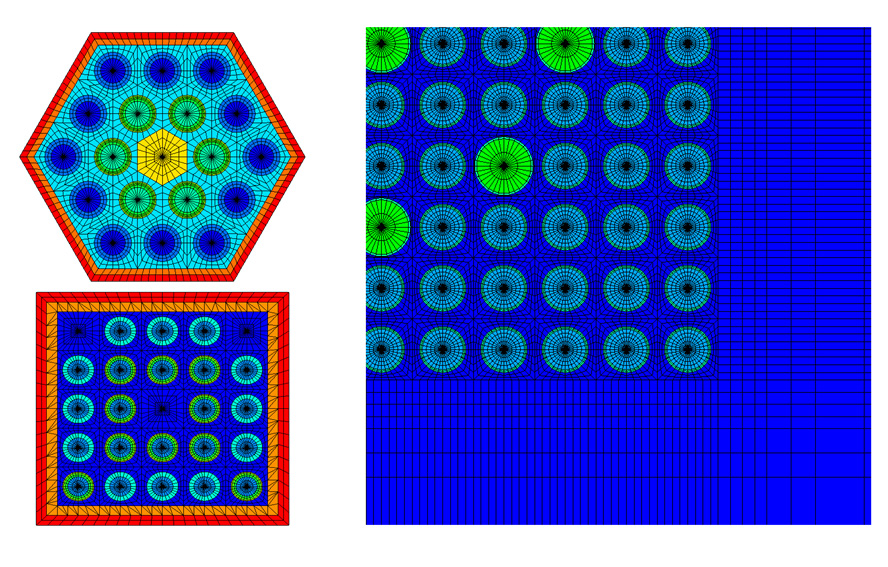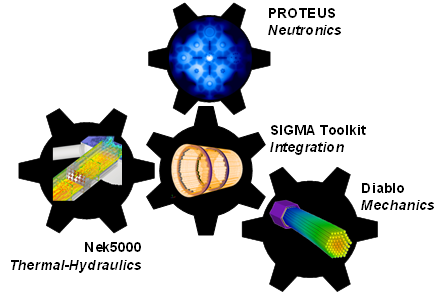PROTEUS
PROTEUS encompasses the set of advanced neutronics modeling and simulation tools developed at Argonne including cross section generation codes, transport solvers, and mesh generation tools. The PROTEUS toolset has been used to study numerous reactor types ranging from small thermal test reactors to large sodium cooled fast reactors. Varying levels of heterogeneity have been modeled and compared to Monte Carlo solutions. For more information, please contact nera-software@anl.gov.

Advanced Cross Section Generation
The Cross Section API (CSAPI) is a standalone functional module for generating thermal and fast reactor multigroup cross sections using the subgroup or resonance table method. The CSAPI module can be adapted to any transport code with a fixed source solver capability. The CSAPI allows transport solvers to generate self-shielded multi-group cross sections on-the-fly, accounting for the effects of heterogeneous geometry as well as temperature and composition. The cross section library is generated using MC2-3 and NJOY for the reactor spectrum type of interest. The CSAPI is implemented directly into the SN and MOC transport solvers of PROTEUS.
The MC2-3 code generates accurate multigroup neutron and gamma cross sections for fast reactor applications, including the effect of spatial heterogeneity. Recently capabilities have been extended to provide thermal cross sections and 3D MOC calculations. The MC2-3 / DIF3D system has been extensively verified, validated using various numerous fast reactor experiments, and utilized for fast reactor design and analysis
The GenISOTXS software allows users to use multigroup cross sections generated from Serpent and OpenMC Monte Carlo codes for PROTEUS as well as the conventional fast reactor analysis code DIF3D.
High-Fidelity Neutron Transport Solvers
PROTEUS-SN (SN2ND) is a massively parallel neutron transport code solving the discrete ordinates formulation of the even-parity transport equation. The spatial discretization is based on a fully unstructured conformal finite element mesh and can handle more than 1012 DOFs via parallelization in space and angle domains. PROTEUS-SN includes steady state and adiabatic quasi-static kinetics formulations, a fixed source solver, and forward and adjoint calculations. PROTEUS-SN has been used to model nuclear reactor cores ranging from the Advanced Test Reactor (ATR), the Zero Power Reactor (ZPR-6/7), and various sodium cooled fast reactor designs (ABTR, ASTRID, MONJU).

PROTEUS-MOC (MOCEX) combines the 2D MOC method (unstructured mesh) with the discontinuous Galerkin finite element method in the axial direction to efficiently solve 3D axially-extruded geometries. MOCEX is a promising tool to solve axially complex geometry problems without the limitations of the 2D/1D approach (e.g., DeCART). The MOCEX has been used to model nuclear reactor cores including TREAT, RPI reactor, VHTR, and C5G7, demonstrating excellent accuracy even for core problems with significant neutron streaming.

PROTEUS-NODAL, a modernized form of DIF3D-VARIANT based on homogenized assemblies and equivalence theory, solves 3-D reactor cores in Cartesian or hexagonal geometries for stead-state and transient conditions.
Mesh Tools
PROTEUS includes an extensive set of mesh processing tools to assist users with the creation of unstructured finite element meshes without the need for licensed external software. Both hexagonal and Cartesian geometries are supported. Explicit pins, cladding, and ducts can easily be modeled with varying mesh fidelity.
An EXODUS II finite element mesh convertor utility is also available to convert externally generated EXODUS II meshes (e.g. generated with CUBIT) into the PROTEUS native mesh format.

SHARP: Multiphysics Simulation Toolkit for Nuclear Reactor Analysis
SHARP is a set of multiphysics software developed under the DOE-NEAMS program for the coupled multiphysics analysis of nuclear reactor phenomena. SHARP currently utilizes the PROTEUS neutronics code, the Nek5000 thermal-hydraulics code, and the Diablo structural mechanics code to perform online, coupled analysis. For more information on SHARP, please contact sharp-dev@mcs.anl.gov.
